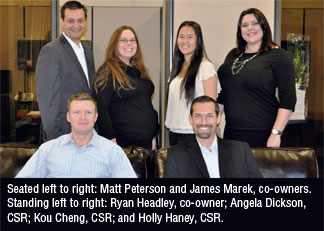 For a time in the mid '90s, James Marek spent his days scrubbing cat urine out of carpets.
For a time in the mid '90s, James Marek spent his days scrubbing cat urine out of carpets.
It wasn't exactly glamorous work, but after a failed attempt at operating a chain of juice bars, it was a way to pay the bills. Insurance came to him purely by chance when a fellow carpet cleaner suggested he get his insurance license.
“At the time, anything sounded better,” Marek said.
Recommended For You
Want to continue reading?
Become a Free PropertyCasualty360 Digital Reader
Your access to unlimited PropertyCasualty360 content isn’t changing.
Once you are an ALM digital member, you’ll receive:
- Breaking insurance news and analysis, on-site and via our newsletters and custom alerts
- Weekly Insurance Speak podcast featuring exclusive interviews with industry leaders
- Educational webcasts, white papers, and ebooks from industry thought leaders
- Critical converage of the employee benefits and financial advisory markets on our other ALM sites, BenefitsPRO and ThinkAdvisor
Already have an account? Sign In Now
© 2025 ALM Global, LLC, All Rights Reserved. Request academic re-use from www.copyright.com. All other uses, submit a request to [email protected]. For more information visit Asset & Logo Licensing.








